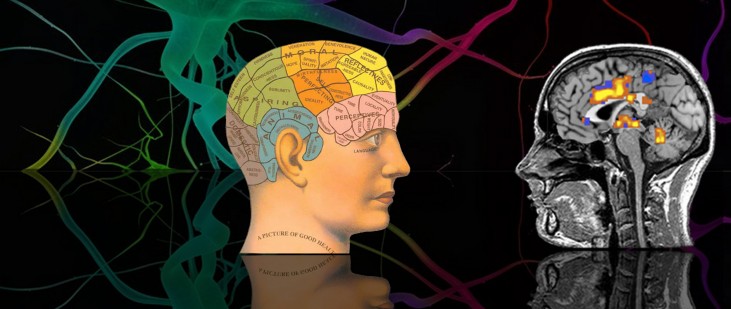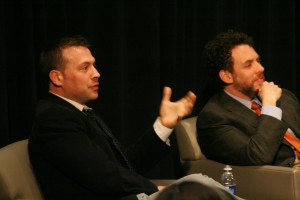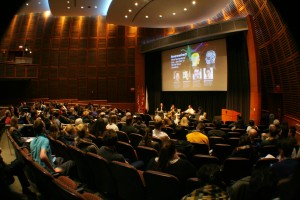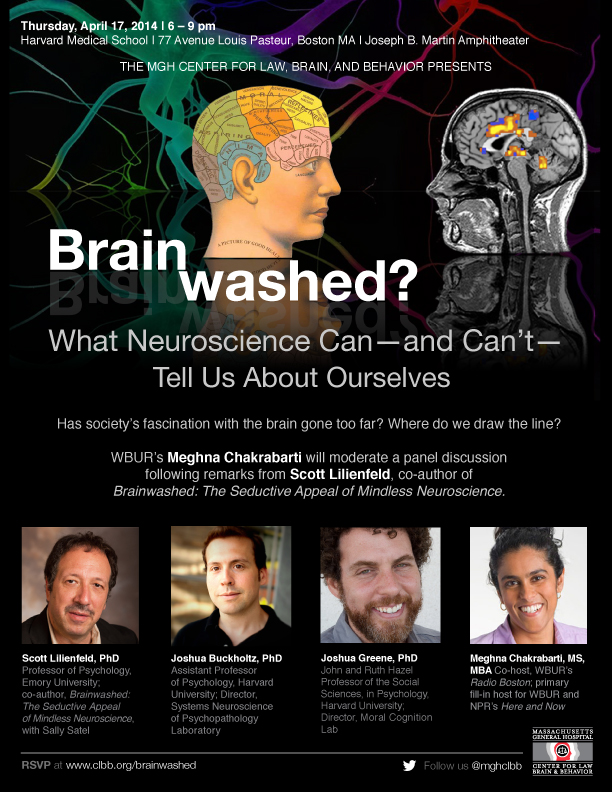 While brain science has helped to characterize many aspects of the human experience, there is no consensus about whether it could also be used to help address some of society’s “big” problems.
While brain science has helped to characterize many aspects of the human experience, there is no consensus about whether it could also be used to help address some of society’s “big” problems.
On Thursday, April 17, 2014, CLBB hosted a conversation at the Joseph B. Martin Conference Center of Harvard Medical School, with experts in psychology, philosophy and neuroscience to debate whether neuroscience has anything useful to add to our understanding of thorny ethical and legal questions, such as whether addiction should be considered a “brain disease,” the nature of free will, and how societies should determine personal responsibility. Video of the event is included below in its entirety and at our Vimeo page.
A recurring theme of the evening’s discussion was how to determine which level of analysis – from molecules and genes to brain structures and systems to individuals and social systems – is the most important to consider for understanding the mind. While all panelists agreed that any discussion of the brain’s contribution to behavior should be embedded within a multi-level approach, there was considerable disagreement around whether the brain’s contribution should be considered privileged or not.
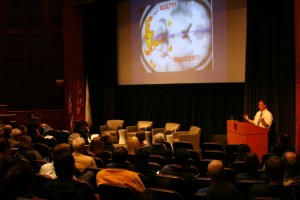
Scott Lilienfeld, PhD, co-author, with Sally Satel, of Brainwashed: The Seductive Appeal of Mindless Neuroscience opened the discussion with remarks based on his recent book, which raised questions about the increasing influence of neuroimaging in psychology. On the practical side, he noted that it is now difficult to obtain funding for behavioral research without incorporating biological measures – specifically brain imaging – and that universities’ hiring of neuroscientists has escalated while hiring of psychologists studying behavior alone has waned. Moreover, Lilienfeld suggested these trends imply an emerging “neurocentrism” – an assumption that the brain is the most important level of analysis for understanding many aspects of human behavior, while de-emphasizing the psychological, social, and cultural levels. He suggested that a growing field of sub-disciplines, such as “neuroprofiling,” “neurosexology,” and “neurocriminology,” demonstrate the growing acceptance by the general public that brain science can lend an air of authority to nearly any field of study.
And yet, Lilienfeld pointed out that in many cases there is no clear value added by invoking biological explanations to the field’s primary knowledge base. Lilienfeld also expressed concern that the reconceptualizing of mental disorders as brain diseases obscures a rich understanding of these syndromes that clinicians rely on in treating patients. Focusing on the biological explanations for addictions or criminal behavior, Lilienfeld argued, may reduce stigma but increase the likelihood that a person will not be held accountable for their actions and may become more likely to consider their condition hopeless or immutable.
Following Lilienfeld’s remarks, Meghna Chakrabarti, MS, MBA, of WBUR’s Radio Boston, moderated a discussion that explored and contrasted Lilienfeld’s views with two Harvard psychologists and CLBB faculty members: Joshua Greene, PhD, the Ruth and John Hazel Professor of the Social Sciences in Psychology and director of the Moral Cognition Lab at Harvard University and Joshua Buckholtz, PhD, assistant professor of psychology and director of the Systems Neuroscience of Psychopathology Lab. Both Greene and Buckholtz use neuroimaging in their research into morality and psychopathology, respectively. And yet, both were supportive of Lilienfeld’s suggestion that neuroscientific evidence is often misinterpreted or overgeneralized by the media.
Buckholtz noted, however, that while Brainwashed provided a legitimate and thorough critique of some of the problems with neuroimaging research, the book uses this general critique to make a deeper, and more politically charged claim: that individuals should be held responsible for their own behavior, regardless of any neurobiological explanations. While Lilienfeld self-identifies as a “reluctant determinist,” his determinism is incongruous with his position that substance abuse disorder involves a series of incremental, freely-made bad decisions. Greene commented that this perspective – that one can resist addiction if they try hard enough – is a poorly supported but widely held political view.
Greene also noted that a point of confusion arises from conflating the terms “biological” or “brain-based” with “hard-wired.” If we accept that population differences may also be brain differences, it is critical that one is clear that these brain differences are not “hard-wired.” Greene noted that almost nothing that is hard-wired from birth is what neuroscientists and psychologists are interested in.
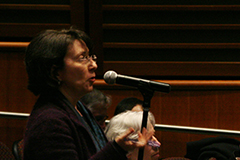 During a lively audience Q&A, Lisa Feldman Barrett, Northeastern University neuroscientist and psychologist and CLBB faculty member, challenged the panelists on essentialist assumptions they and the public may make about biological, genetic, or neuroscientific evidence as having ultimate authority. Barrett cited Richard Lewontin’s Biology as Ideology, which recounts early genetics’ essentialization of genes as the essence of biological explanation for human behavior, prior to an understanding of epigenetic influences. She suggested that, without a multi-level systems approach prioritizing all levels of analysis which study behavior, brain science may, too, fall short.
During a lively audience Q&A, Lisa Feldman Barrett, Northeastern University neuroscientist and psychologist and CLBB faculty member, challenged the panelists on essentialist assumptions they and the public may make about biological, genetic, or neuroscientific evidence as having ultimate authority. Barrett cited Richard Lewontin’s Biology as Ideology, which recounts early genetics’ essentialization of genes as the essence of biological explanation for human behavior, prior to an understanding of epigenetic influences. She suggested that, without a multi-level systems approach prioritizing all levels of analysis which study behavior, brain science may, too, fall short.
Barrett’s question illuminated what, over the course of the evening, had become clear: the cultural disparities between the brain scientists and psychologists are pronounced. While Lilienfeld’s view has political implications, so too is Greene and Buckholtz’ position that brain science is a level of analysis which should be prioritized over other (psychological, social, or behavioral) levels of analyses.
The evening demonstrated a lot of agreement about the need for more science in each of these disciplines. But beyond more science, there is critical need for cultural bridging of disciplines which have historically occupied isolated silos, so that these silos can move beyond feeling threatened by each other, and toward collaborating on the multi-level systems analysis approach that is essential for understanding human experience and finding appropriate solutions to challenging social issues like addictions and criminal behavior.
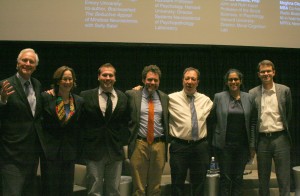 As an institution invested in the translation of neuroscience into law and policy, CLBB is committed to building bridges among disciplines that can, together, offer more robust explanations for questions that we ask.
As an institution invested in the translation of neuroscience into law and policy, CLBB is committed to building bridges among disciplines that can, together, offer more robust explanations for questions that we ask.
To watch video of the entire event, or explore past events in memory, capacity, and empathy, see CLBB’s Vimeo channel.

